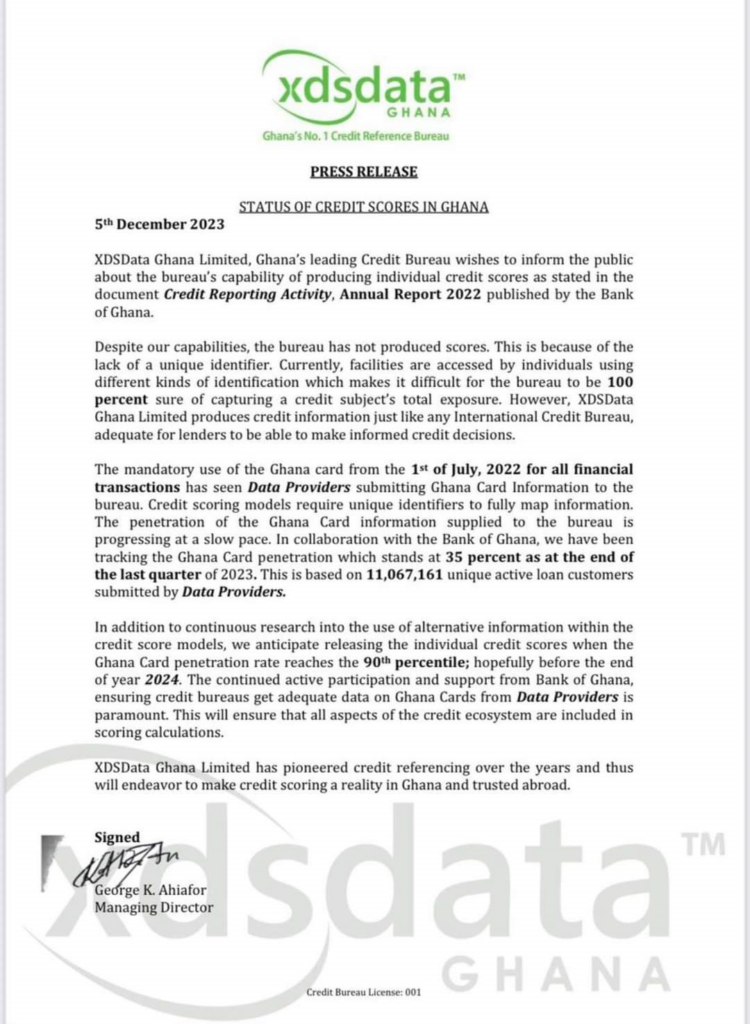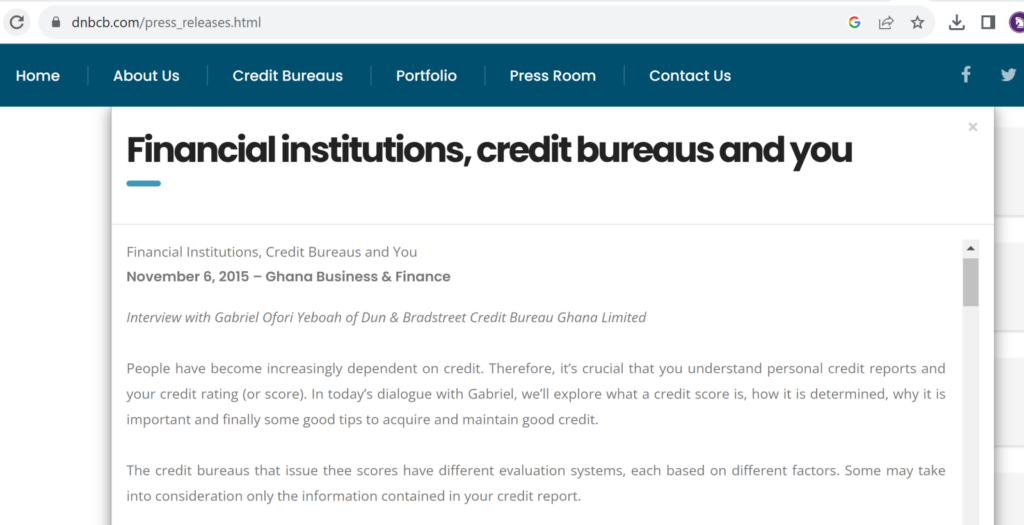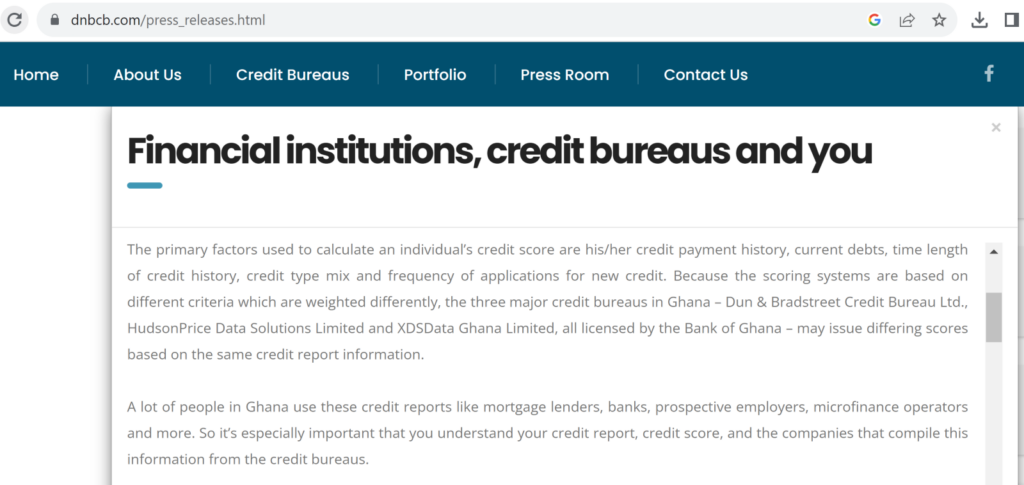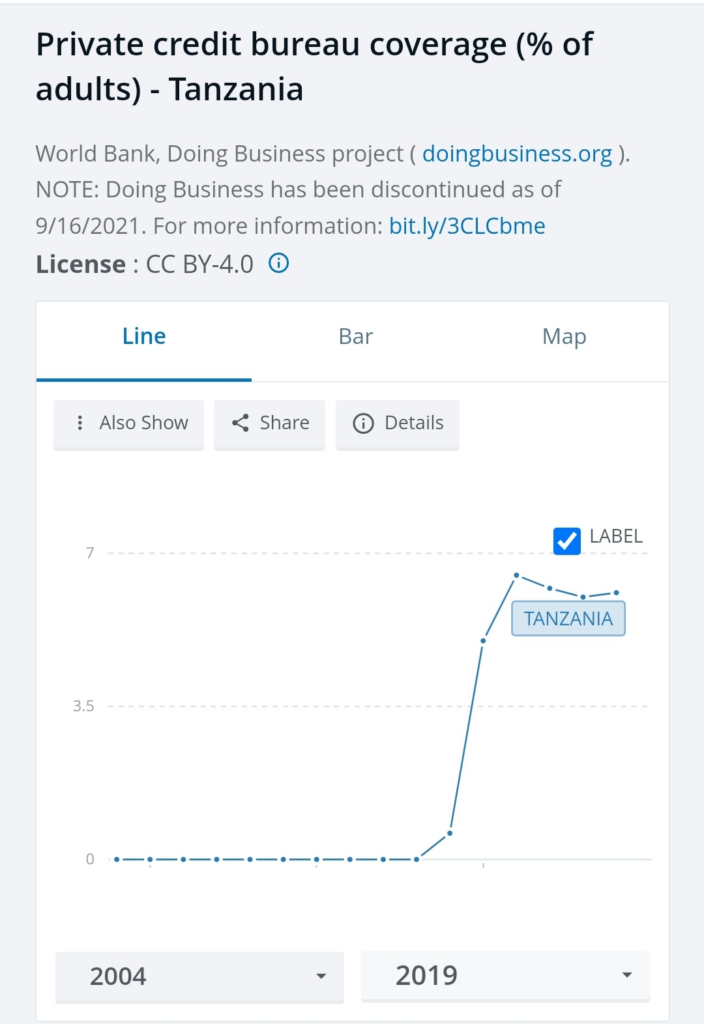
[This is a developing story. This post may therefore be expanded over time.]
Readers may recall a recent essay challenging a claim by the Vice President (Veep) of Ghana that the government will, for the first time, be introducing individualised credit scoring in Ghana, made possible by the Ghana Card.
Ghana’s Credit-Scoring Situation
Two main points were canvassed:
- Credit scoring in some form and at some level already happens in Ghana so the claim that, currently, lenders/creditors have no means of distinguishing among loan applicants cannot be correct.
- The problems that bedevil credit scoring in Ghana have more to do with insufficient, infrequent, patchy, and sometimes poor-quality, reporting of data on credit-related transactions by the institutions designated as data providers (such as banks, microfinance firms, telecoms, retailers and utilities).
- These reporting problems have more to do with cost, capacity, training and personnel than with the lack of a mandatory national ID system per se. Hence, the Ghana Card will make no essential difference. Ghana Card data is already being reported by data providers to the two currently licensed credit bureaus, and the form used to submit data has had a provision for it (as well as other ID types such as passports and driver’s licenses) from as far back as 2012.
- Furthermore, the credit reporting database captures more essential data than the Ghana Card, including E-Zwich information, as part of 178 data fields.
Yesterday, the local Managing Director (MD) of one of the two credit bureaus, XDS Data, issued an extremely curious statement that ended up confusing matters even more. Below, we reproduce the entire statement.
The Story According to XDS

Careful reading of the statement should elicit some useful insights:
- The number of adults captured in Ghana’s current regulated credit databases is more than 11 million, thus nearly 70% of adults are captured, not the 20% claimed by the Technical Advisor to the Veep recently.
- Only 35% of adults seeking credit in the economy have Ghana Cards. Nonetheless, as claimed in our earlier essay, Ghana Card information is already being submitted to the credit bureaus.
- Reporting continues to be a major challenge for credit bureaus since regulations appear to be flouted by designated data providers. Our checks suggest that some utilities like the Electricity Corporation of Ghana and Ghana Water are not in full compliance with Bank of Ghana (BoG) regulations on reporting. Many retailers, such as car dealerships that offer credit, are not reporting. This corroborates our assertion that poor awareness, capacity, and commitment concerning reporting are the main challenges.
XDS’ intervention would have been very helpful to the discussion if it had stopped at relating the factual situation on the ground and mentioned ongoing efforts to improve reporting (including fuller submission of Ghana Card data). Instead, the MD then proceeded to make a number of bizarre statements completely at odds with the evidence in the public domain.
He claims that:
- Though XDS has the capability to convert credit report information into scores (as happens elsewhere), they are not able to do so because not enough people in their databases are identified by their Ghana Card. By law, those people must have been identified by another form of ID, such as a passport or driver’s license.
- XDS is not able to vouch for the accuracy of the human identification associated with the reports it issues on individuals.
- He was silent about the situation related to businesses, which are also subject to credit referencing in Ghana.
- Until 90%+ of the borrowers in the XDS credit database have Ghana Card information, XDS will not proceed to generate credit scores, though it will continue to issue the individualised credit reports and urge lenders to utilise them in their decision-making.
These are very problematic and in some cases plainly illogical, arguments.
Truth is Stranger than Fiction in Ghana
This author had anticipated that something like this would happen because soon after the Veep’s claims were challenged, and evidence from the websites of the credit bureaus, interviews their officers had given, and official reports, were used in that exercise, strange things started to happen.
First, the website of XDS went down. For a credit bureau, the website is one of the main channels through which clients interact with the services on offer, so it is unthinkable for the website to be down for nearly a week. But that is precisely what has happened.

With the website now off the net, XDS could issue a statement claiming that it has not been generating credit scores at all. Not even estimated scores, to talk less of predictive scores. Yet, a few days before the website went down, it was boldly advertising credit scores online and even providing details of the scorecard. Readers can judge for themselves below.

It is impossible to speculate what could have led to the sudden about-turn. But once this author learnt that one of Ghana’s leading financial regulators, the current Head of the Securities & Exchange Commission and long-time Director of Databank (a major XDS investor), has long been on the XDS board, and immediately the Bank of Ghana announced an increase in minimum capital for credit bureaus in Ghana, it became clear that the credit bureaus would have to tow the line and support the government narrative.

It is very likely that the other credit bureau, Duns & Bradstreet, will also be under pressure to recant the content in various interviews its officers have given in recent times explaining the credit scoring system as it pertains to Ghana and/or that the interviews will miraculously disappear. As has been the case of Asaase Radio:

That is the extent to which political influence shape business decision-making in Ghana.
Luckily, a cached version exists that the reader is encouraged to save on their device, if that sort of sleuthing is their thing. It will be more surprising if the traces of such interviews were to disappear from D&B’s own website, however, given its stronger international reputation.


Pointless Backtracking
What is even sadder is that the “Ghana Card before Credit Scores” argument doesn’t even serve the public relations goals of the government.
Parsed carefully, the argument implies two damning verdicts on the state of the financial system in Ghana.
- Given that XDS Ghana is part of a network started by South African entrepreneur, Vivian Pather, and that the MD of XDS Ghana was instrumental in setting up the affiliate in Nigeria, it is curious how XDs (now “FirstCentral”) is able to do credit-scoring in Nigeria but not in Ghana.

- How is it that the Nigerian version of XDS manages to not only do credit-scoring but has been offering free monthly scores to Nigerians for years now, yet can’t do same in Ghana due to weaknesses in the architecture, if the twisted new claims are to be believed? Duns & Bradstreet (D&B) Ghana is also treated as one unit with the Tanzanian branch of D&B. How is it that as far back as 2019, D&B has been offering credit scoring in Tanzania?
- If the current government of Ghana has had 7 years to take credit scoring in Ghana to its deserved heights, and yet today, virtually every major economy in Africa is already offering credit scoring but Ghana is not, then the Veep’s announcement is more cause for sad reflection than a triumph to celebrate.
Is Ghana that behind?
- Rwandans began to benefit from credit scoring as far back as 2013. Such that in 2015, the market was even attractive enough for TransUnion to launch its full suite of predictive analytics based on individual credit scoring.
- Likewise for Ugandans. As far back as 2011.
- Kenya has been doing this since at least 2017.
Now, the glaring question for the Veep, the BoG, and the credit bureau bosses dancing to whoever’s tune is how exactly these countries got to where they are without their equivalent of the Ghana Card reaching the high penetration they claim is needed for credit scoring to commence.
- According to Nigeria’s own official data, only 9% of Nigerians had the NIN (the country’s equivalent of Ghana Card) by the time credit scoring started.
- It was not until 2019 that Kenya began a mass drive for a national digital ID. And Uganda started issuing digital National IDs like Ghana’s in 2015, four years after credit-scoring launched.
So, what then is the cause of Ghana’s backwardness such that only Ghana Card can save the situation, and why has the government not been able to fix things for 7 years?
And what at all is “credit scoring”?
The credit score merely distills the information in the credit report into a single score, which simply represents the probability that a particular borrower, based on all the information in the credit report, will likely repay a loan or other credit facility.
To build a credit scoring model, what the credit bureau requires is enough information about the population and the credit market to get a sense of how certain credit behaviors point to likelihood to repay and personalise it.
The longer the credit data collection has been going on and the wider the population to which it applies, the stronger the model. Which is why it is surprising to know that Ghana, where collection has been going on since 2010 and now covers nearly 70% of adults, scoring is not feasible whereas Tanzania, where data collection started in 2015, managed to introduce credit scoring in 2019 when only 7% of adults were covered by the credit referencing scheme.

The main idea being championed by the Veep’s allies in this quest, and seemingly corroborated by the XDS statement, is that Ghana Card will prevent people acquiring loans with different identities and somehow make the credit scores more credible. That argument is incoherent.
- The credit bureaus admit issuing individual credit reports. The law requires lenders to use these. If the identification is so messy that they can’t condense the report into a score, then the reports themselves have little value.
- There is no guarantee that Ghana Card prevents multiple identities from being used in the economy. We have all had front-row seat to a salacious saga in which a religious minister, of all people, has been using multiple identities despite having a Ghana Card. In fact, the said minister was even rewarded with a diplomatic passport. All this corroborated by a Court of Law.
- In a credit scoring context, multiple identities don’t really help the borrower. The key issue is the payment history and whether positive and negative information is being reported. Assume a person has three different credit profiles based on three identities. If they abuse one profile, it ceases to be useful, limiting their ability to leverage it. Meanwhile, the positive data will be split among different identities, denying them of the benefit of a long track record of positive credit behaviour. Careful analysis should show that this is not the biggest danger to credit scoring effectiveness hence why the countries with the strongest credit markets like the USA, UK and Canada not requiring a Ghana Card type system to operate. The problem of “synthetic identities” mean that criminals will be able to hijack people’s identities even when they have a Ghana Card just as today Ghana Card has not prevented SIM Card fraud in Ghana.
- Nor should we forget that countries that have been implementing credit scoring in Africa have discovered that abuse of the credit scores due to faulty reporting is the main challenge and not identity fraud, per se. A Tanzanian court recently fined a bank because of this, and Kenya has had to issue updated regulations.
In short, the Veep needs to find a more compelling story about how he will improve credit outcomes for borrowers in Ghana and respectfully ditch this Ghana Card mantra.



